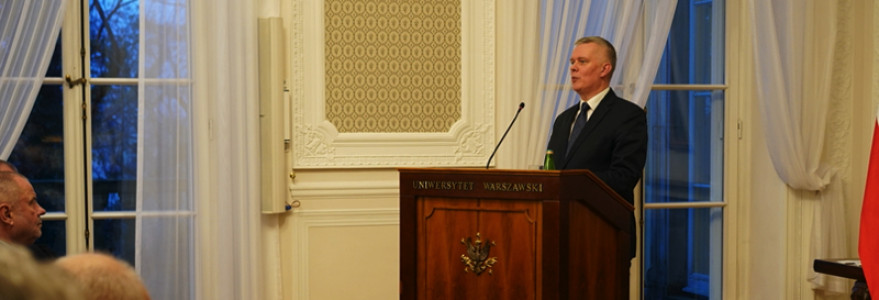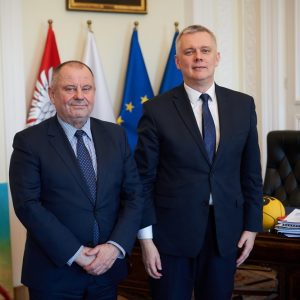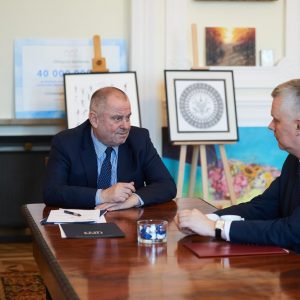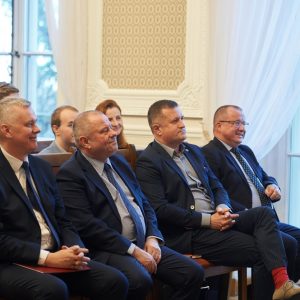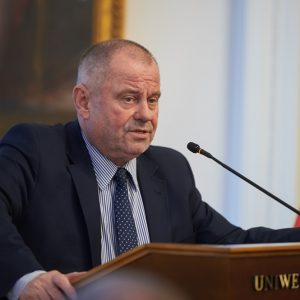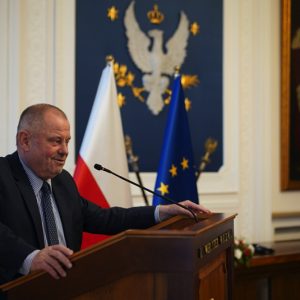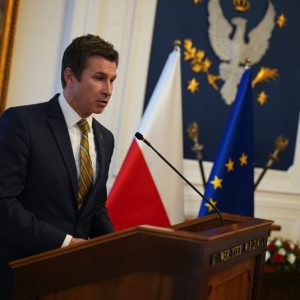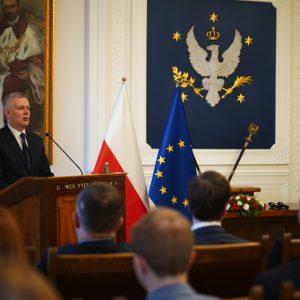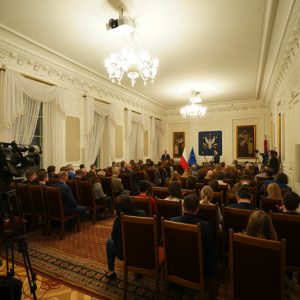Tomasz Siemoniak, the member of the Council of Ministers and the coordinator of special services, spoke at the University of Warsaw about security, the importance of awareness and Poland’s role in Europe. The lecture, at the invitation of the UW Rector, was held on 26th February in the Senate Hall of the Kazimierzowski Palace.
On 26th February, a meeting was held between the Rector of the University of Warsaw and Tomasz Siemoniak, member of the Council of Ministers. The topics related to cooperation were discussed during the meeting. Then, in the Senate Hall of the Kazimierzowski Palace, Minister Siemoniak gave a lecture on security, the importance of awareness and Poland’s role in Europe.
“It is an honour to host the Minister at the University of Warsaw. This visit perfectly fits the image of our University, which is a place full of tolerance and open to discussion; one from which numerous representatives of the political and socio-economic environment have come,” Prof. Alojzy Z. Nowak, the Rector of the University of Warsaw said, adding: “The meeting will be a good opportunity to discuss the situation in Europe and security. From the perspective of the University, the knowledge of the world is extremely important.”
Clash of consciousness
During his lecture, Tomasz Siemoniak addressed the issue of security in the context of the current geopolitical situation.
“The events in Ukraine have changed history. Previously, it seemed that security issues would not absorb us. The huge popularity of geopolitics in recent times testifies to people’s interest in these issues. I would like to point out the importance of awareness. Politicians make decisions based on an assessment of the situation. In the case of the Russian Federation and Poland, there is a clash of two consciousnesses: thinking respectively in terms of the results of the Second World War and the perspective formed with the beginnings of the Third Republic. The situation is therefore serious,” the Minister emphasised.
He also pointed out that the answer to the question of whether Poland is under threat is “yes”.
“However, this is not a matter of the last few or several dozen years. This threat was already present in the times of Mieszko I or before the invasion of the Teutonic Knights. The sense of threat is in our DNA. It stems from historical experience. The essence of politics lies in recognising these threats and trying to reduce them. The examples of such efforts were the accession to the NATO and then to the EU,” Tomasz Siemoniak said.
Due to the difficulty of predicting the course of future events, he emphasised the value of debate, conversation and reflection – especially in places like the University of Warsaw.
“The loss of Ukraine would increase the threat in Poland. The role of our country is special in the current situation. We must take care, above all, of as many allied relations as possible,” Tomasz Siemoniak added.
The lecture was followed by a debate involving UW students, doctoral candidates and employees, as well as guests in attendance. The discussion was moderated by Robert Grey, the Chancellor of the University. Participants discussed such topics as national defence policy, the functioning of the special services, arms expenditure or peace alliances.
Tomasz Siemoniak is a graduate of the Foreign Trade Faculty at the Warsaw School of Economics and a scholarship holder at the University of Duisburg.
He was, the Director of the press and information office at the Ministry of National Defence, the Deputy Chairman of the supervisory board of the Polish News Agency. From December 2000 to mid-2002, he was the Deputy Mayor of Warsaw. From 2002 to 2006, he was named as a board member of the Polish Radio, and then served as the Deputy Marshal of the Masovian Voivodeship until 2007.
In November 2007, he was appointed Secretary of State at the Ministry of the Interior and Administration, and from 2011 he served as Minister of National Defence. In September 2014, he took office as Deputy Prime Minister. Since 2015, he has been a member of the Polish Sejm.
In December 2023, he was appointed the Minister – Member of the Council of Ministers and the Coordinator of special services.



